Foreign Investment in Libya: Current Scenario and Future Prospects
VerifiedAdded on 2023/06/13
|8
|1852
|380
Essay
AI Summary
This essay examines the current economic situation in Libya, focusing on the role of foreign direct investment (FDI) in the country's development. It highlights Libya's efforts to attract FDI through legal and policy advancements, leveraging its oil and gas reserves, strategic location, and potential in sectors like tourism. The essay also addresses challenges such as political instability and administrative issues that hinder investment flows. It further discusses initiatives to combat exploitation, promote transparency, and align with international trade standards to enhance Libya's attractiveness to foreign investors, ultimately concluding that Libya is making strides in promoting foreign investment and economic development despite existing obstacles. Desklib offers a range of study tools and resources for students.
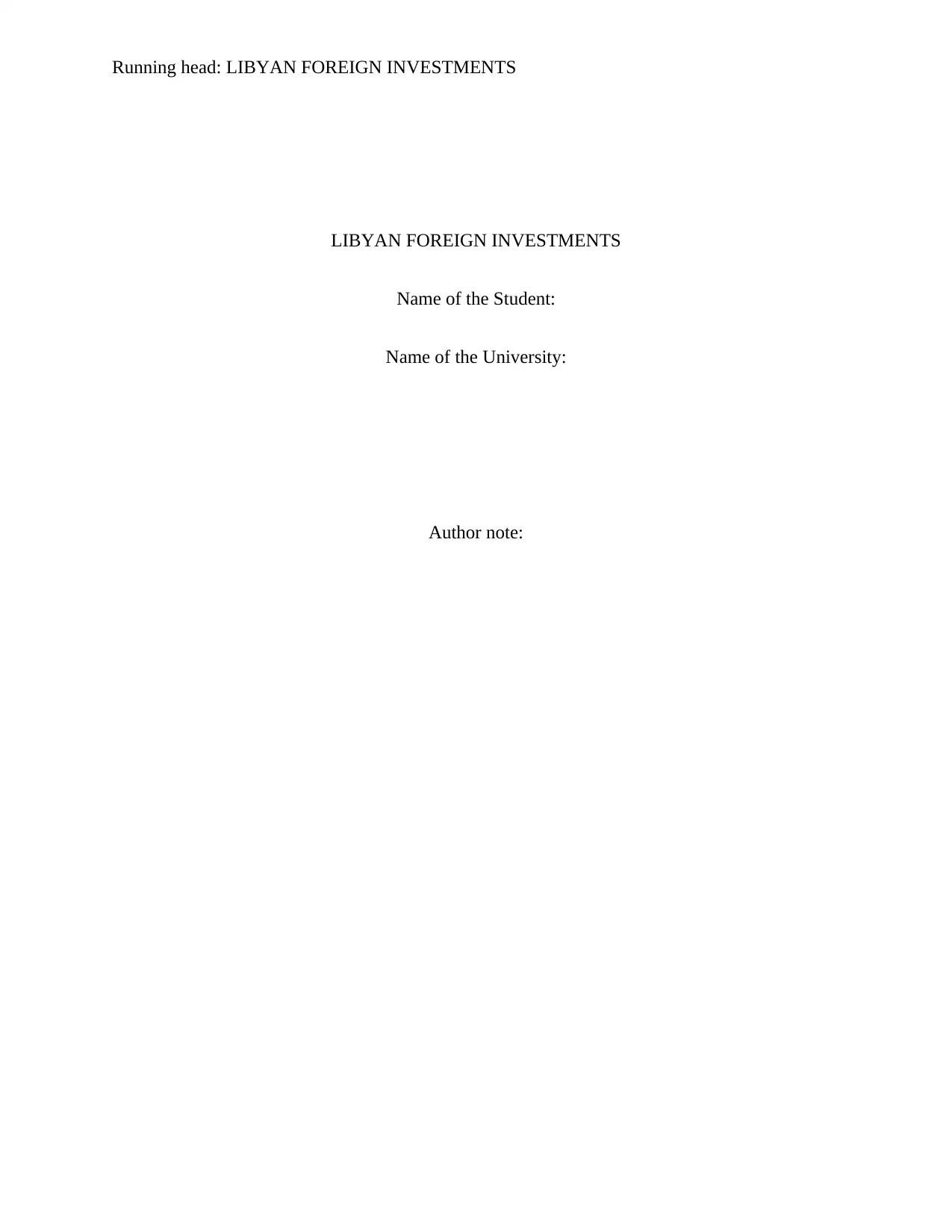
Running head: LIBYAN FOREIGN INVESTMENTS
LIBYAN FOREIGN INVESTMENTS
Name of the Student:
Name of the University:
Author note:
LIBYAN FOREIGN INVESTMENTS
Name of the Student:
Name of the University:
Author note:
Paraphrase This Document
Need a fresh take? Get an instant paraphrase of this document with our AI Paraphraser
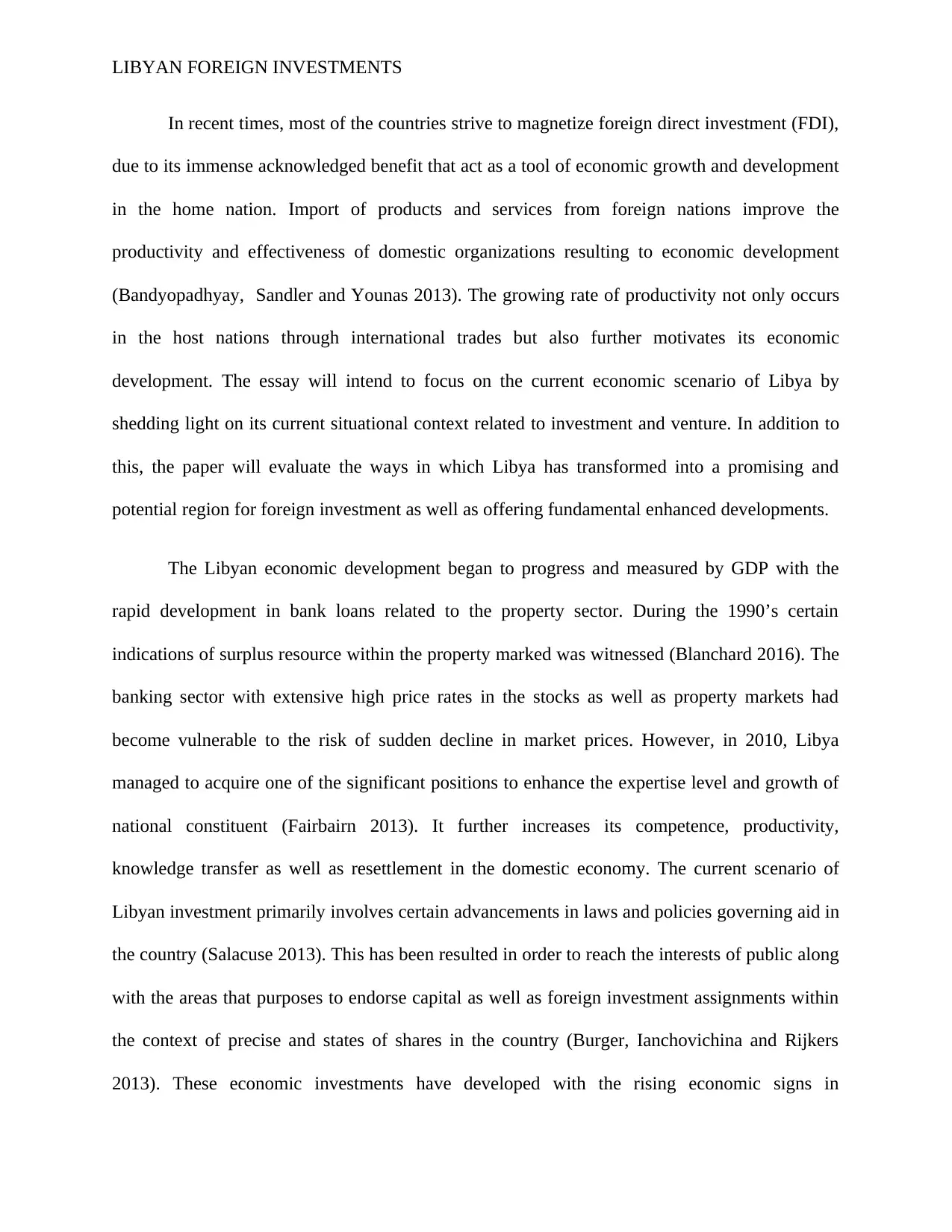
LIBYAN FOREIGN INVESTMENTS
In recent times, most of the countries strive to magnetize foreign direct investment (FDI),
due to its immense acknowledged benefit that act as a tool of economic growth and development
in the home nation. Import of products and services from foreign nations improve the
productivity and effectiveness of domestic organizations resulting to economic development
(Bandyopadhyay, Sandler and Younas 2013). The growing rate of productivity not only occurs
in the host nations through international trades but also further motivates its economic
development. The essay will intend to focus on the current economic scenario of Libya by
shedding light on its current situational context related to investment and venture. In addition to
this, the paper will evaluate the ways in which Libya has transformed into a promising and
potential region for foreign investment as well as offering fundamental enhanced developments.
The Libyan economic development began to progress and measured by GDP with the
rapid development in bank loans related to the property sector. During the 1990’s certain
indications of surplus resource within the property marked was witnessed (Blanchard 2016). The
banking sector with extensive high price rates in the stocks as well as property markets had
become vulnerable to the risk of sudden decline in market prices. However, in 2010, Libya
managed to acquire one of the significant positions to enhance the expertise level and growth of
national constituent (Fairbairn 2013). It further increases its competence, productivity,
knowledge transfer as well as resettlement in the domestic economy. The current scenario of
Libyan investment primarily involves certain advancements in laws and policies governing aid in
the country (Salacuse 2013). This has been resulted in order to reach the interests of public along
with the areas that purposes to endorse capital as well as foreign investment assignments within
the context of precise and states of shares in the country (Burger, Ianchovichina and Rijkers
2013). These economic investments have developed with the rising economic signs in
In recent times, most of the countries strive to magnetize foreign direct investment (FDI),
due to its immense acknowledged benefit that act as a tool of economic growth and development
in the home nation. Import of products and services from foreign nations improve the
productivity and effectiveness of domestic organizations resulting to economic development
(Bandyopadhyay, Sandler and Younas 2013). The growing rate of productivity not only occurs
in the host nations through international trades but also further motivates its economic
development. The essay will intend to focus on the current economic scenario of Libya by
shedding light on its current situational context related to investment and venture. In addition to
this, the paper will evaluate the ways in which Libya has transformed into a promising and
potential region for foreign investment as well as offering fundamental enhanced developments.
The Libyan economic development began to progress and measured by GDP with the
rapid development in bank loans related to the property sector. During the 1990’s certain
indications of surplus resource within the property marked was witnessed (Blanchard 2016). The
banking sector with extensive high price rates in the stocks as well as property markets had
become vulnerable to the risk of sudden decline in market prices. However, in 2010, Libya
managed to acquire one of the significant positions to enhance the expertise level and growth of
national constituent (Fairbairn 2013). It further increases its competence, productivity,
knowledge transfer as well as resettlement in the domestic economy. The current scenario of
Libyan investment primarily involves certain advancements in laws and policies governing aid in
the country (Salacuse 2013). This has been resulted in order to reach the interests of public along
with the areas that purposes to endorse capital as well as foreign investment assignments within
the context of precise and states of shares in the country (Burger, Ianchovichina and Rijkers
2013). These economic investments have developed with the rising economic signs in
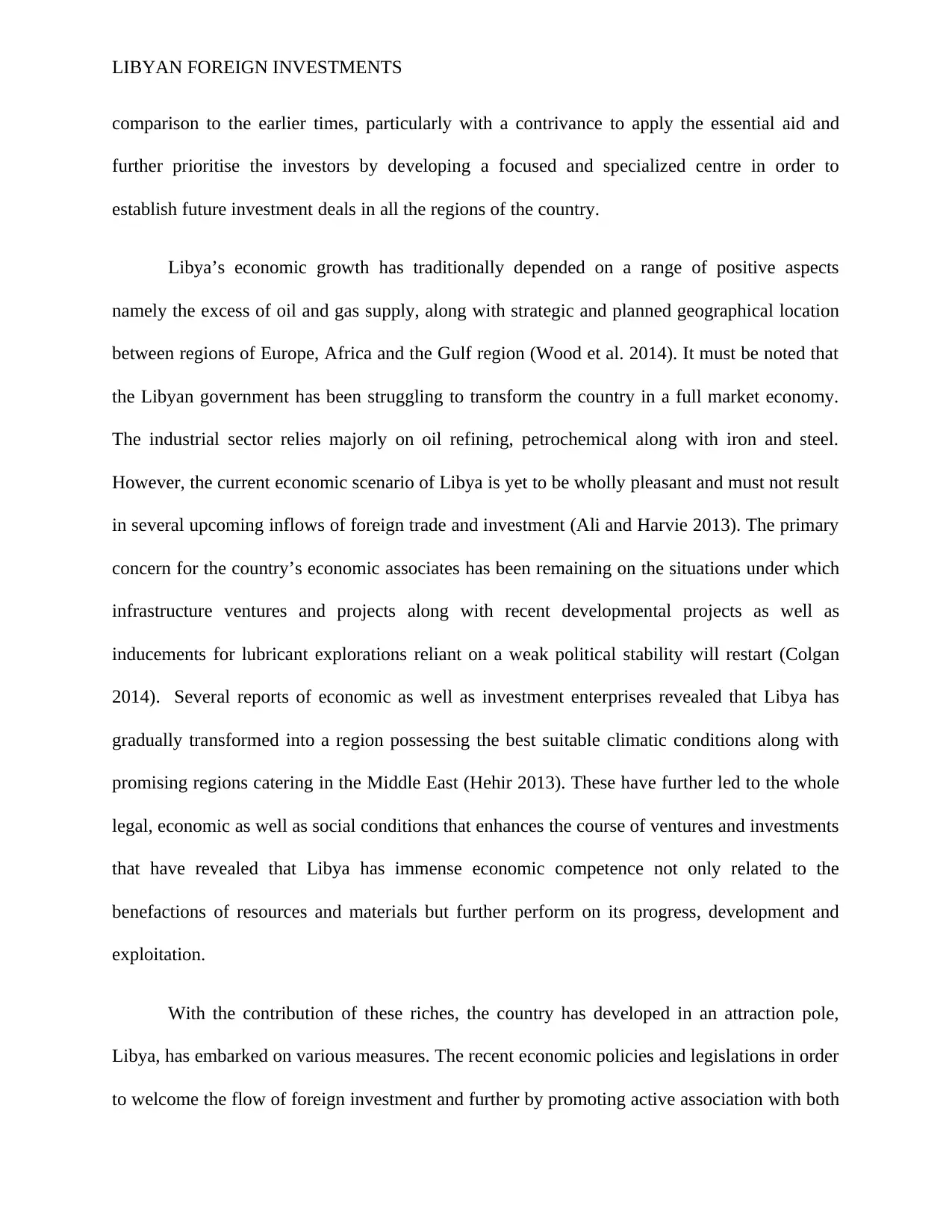
LIBYAN FOREIGN INVESTMENTS
comparison to the earlier times, particularly with a contrivance to apply the essential aid and
further prioritise the investors by developing a focused and specialized centre in order to
establish future investment deals in all the regions of the country.
Libya’s economic growth has traditionally depended on a range of positive aspects
namely the excess of oil and gas supply, along with strategic and planned geographical location
between regions of Europe, Africa and the Gulf region (Wood et al. 2014). It must be noted that
the Libyan government has been struggling to transform the country in a full market economy.
The industrial sector relies majorly on oil refining, petrochemical along with iron and steel.
However, the current economic scenario of Libya is yet to be wholly pleasant and must not result
in several upcoming inflows of foreign trade and investment (Ali and Harvie 2013). The primary
concern for the country’s economic associates has been remaining on the situations under which
infrastructure ventures and projects along with recent developmental projects as well as
inducements for lubricant explorations reliant on a weak political stability will restart (Colgan
2014). Several reports of economic as well as investment enterprises revealed that Libya has
gradually transformed into a region possessing the best suitable climatic conditions along with
promising regions catering in the Middle East (Hehir 2013). These have further led to the whole
legal, economic as well as social conditions that enhances the course of ventures and investments
that have revealed that Libya has immense economic competence not only related to the
benefactions of resources and materials but further perform on its progress, development and
exploitation.
With the contribution of these riches, the country has developed in an attraction pole,
Libya, has embarked on various measures. The recent economic policies and legislations in order
to welcome the flow of foreign investment and further by promoting active association with both
comparison to the earlier times, particularly with a contrivance to apply the essential aid and
further prioritise the investors by developing a focused and specialized centre in order to
establish future investment deals in all the regions of the country.
Libya’s economic growth has traditionally depended on a range of positive aspects
namely the excess of oil and gas supply, along with strategic and planned geographical location
between regions of Europe, Africa and the Gulf region (Wood et al. 2014). It must be noted that
the Libyan government has been struggling to transform the country in a full market economy.
The industrial sector relies majorly on oil refining, petrochemical along with iron and steel.
However, the current economic scenario of Libya is yet to be wholly pleasant and must not result
in several upcoming inflows of foreign trade and investment (Ali and Harvie 2013). The primary
concern for the country’s economic associates has been remaining on the situations under which
infrastructure ventures and projects along with recent developmental projects as well as
inducements for lubricant explorations reliant on a weak political stability will restart (Colgan
2014). Several reports of economic as well as investment enterprises revealed that Libya has
gradually transformed into a region possessing the best suitable climatic conditions along with
promising regions catering in the Middle East (Hehir 2013). These have further led to the whole
legal, economic as well as social conditions that enhances the course of ventures and investments
that have revealed that Libya has immense economic competence not only related to the
benefactions of resources and materials but further perform on its progress, development and
exploitation.
With the contribution of these riches, the country has developed in an attraction pole,
Libya, has embarked on various measures. The recent economic policies and legislations in order
to welcome the flow of foreign investment and further by promoting active association with both
⊘ This is a preview!⊘
Do you want full access?
Subscribe today to unlock all pages.

Trusted by 1+ million students worldwide
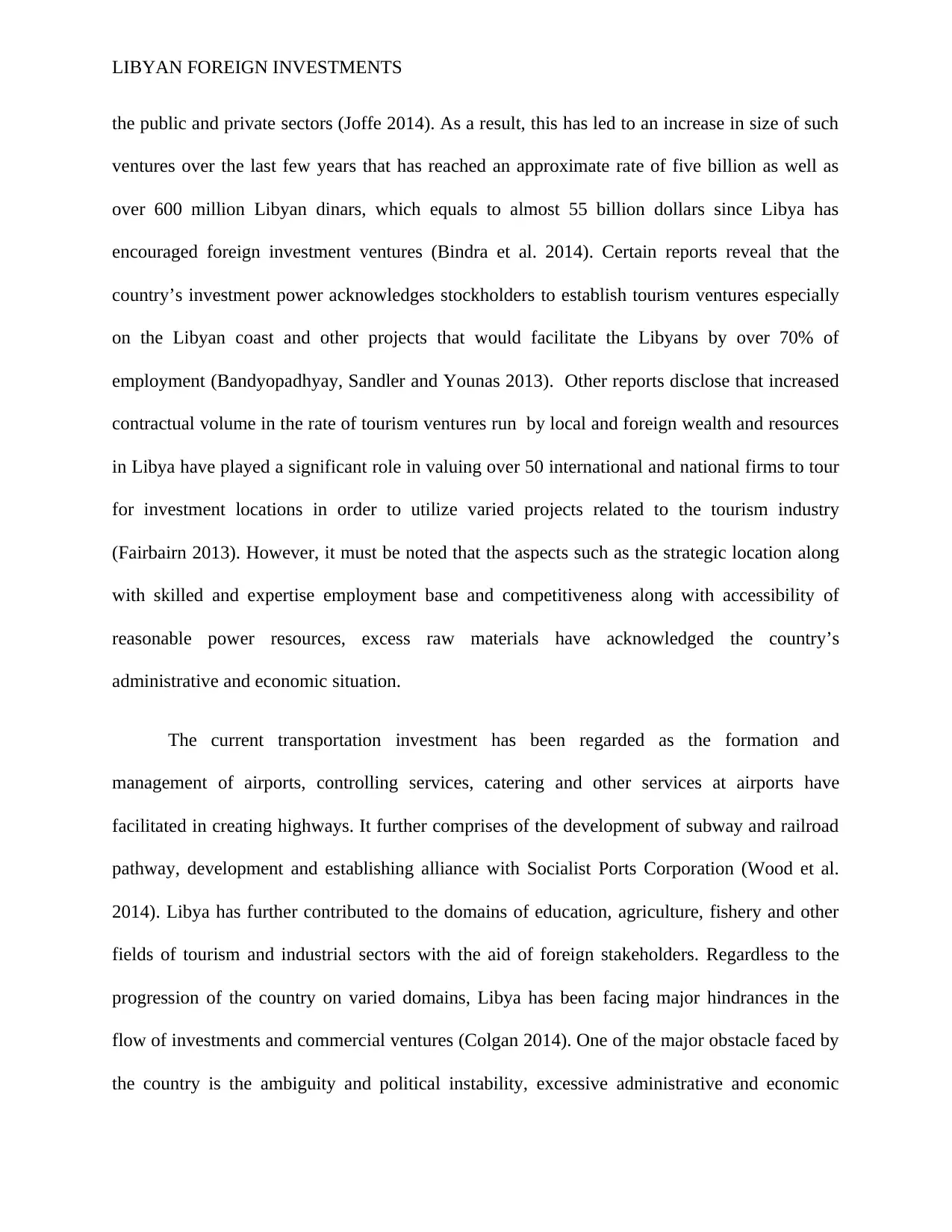
LIBYAN FOREIGN INVESTMENTS
the public and private sectors (Joffe 2014). As a result, this has led to an increase in size of such
ventures over the last few years that has reached an approximate rate of five billion as well as
over 600 million Libyan dinars, which equals to almost 55 billion dollars since Libya has
encouraged foreign investment ventures (Bindra et al. 2014). Certain reports reveal that the
country’s investment power acknowledges stockholders to establish tourism ventures especially
on the Libyan coast and other projects that would facilitate the Libyans by over 70% of
employment (Bandyopadhyay, Sandler and Younas 2013). Other reports disclose that increased
contractual volume in the rate of tourism ventures run by local and foreign wealth and resources
in Libya have played a significant role in valuing over 50 international and national firms to tour
for investment locations in order to utilize varied projects related to the tourism industry
(Fairbairn 2013). However, it must be noted that the aspects such as the strategic location along
with skilled and expertise employment base and competitiveness along with accessibility of
reasonable power resources, excess raw materials have acknowledged the country’s
administrative and economic situation.
The current transportation investment has been regarded as the formation and
management of airports, controlling services, catering and other services at airports have
facilitated in creating highways. It further comprises of the development of subway and railroad
pathway, development and establishing alliance with Socialist Ports Corporation (Wood et al.
2014). Libya has further contributed to the domains of education, agriculture, fishery and other
fields of tourism and industrial sectors with the aid of foreign stakeholders. Regardless to the
progression of the country on varied domains, Libya has been facing major hindrances in the
flow of investments and commercial ventures (Colgan 2014). One of the major obstacle faced by
the country is the ambiguity and political instability, excessive administrative and economic
the public and private sectors (Joffe 2014). As a result, this has led to an increase in size of such
ventures over the last few years that has reached an approximate rate of five billion as well as
over 600 million Libyan dinars, which equals to almost 55 billion dollars since Libya has
encouraged foreign investment ventures (Bindra et al. 2014). Certain reports reveal that the
country’s investment power acknowledges stockholders to establish tourism ventures especially
on the Libyan coast and other projects that would facilitate the Libyans by over 70% of
employment (Bandyopadhyay, Sandler and Younas 2013). Other reports disclose that increased
contractual volume in the rate of tourism ventures run by local and foreign wealth and resources
in Libya have played a significant role in valuing over 50 international and national firms to tour
for investment locations in order to utilize varied projects related to the tourism industry
(Fairbairn 2013). However, it must be noted that the aspects such as the strategic location along
with skilled and expertise employment base and competitiveness along with accessibility of
reasonable power resources, excess raw materials have acknowledged the country’s
administrative and economic situation.
The current transportation investment has been regarded as the formation and
management of airports, controlling services, catering and other services at airports have
facilitated in creating highways. It further comprises of the development of subway and railroad
pathway, development and establishing alliance with Socialist Ports Corporation (Wood et al.
2014). Libya has further contributed to the domains of education, agriculture, fishery and other
fields of tourism and industrial sectors with the aid of foreign stakeholders. Regardless to the
progression of the country on varied domains, Libya has been facing major hindrances in the
flow of investments and commercial ventures (Colgan 2014). One of the major obstacle faced by
the country is the ambiguity and political instability, excessive administrative and economic
Paraphrase This Document
Need a fresh take? Get an instant paraphrase of this document with our AI Paraphraser
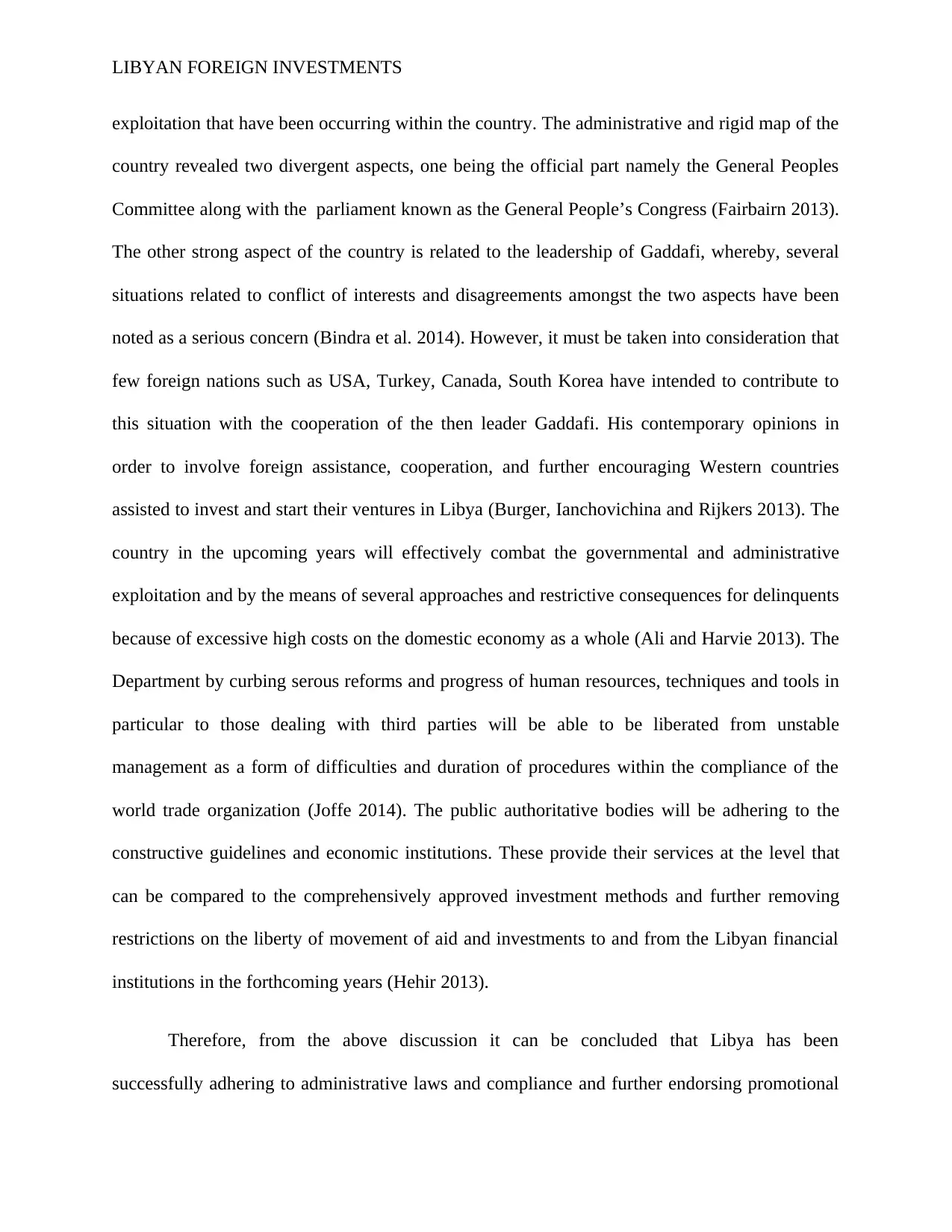
LIBYAN FOREIGN INVESTMENTS
exploitation that have been occurring within the country. The administrative and rigid map of the
country revealed two divergent aspects, one being the official part namely the General Peoples
Committee along with the parliament known as the General People’s Congress (Fairbairn 2013).
The other strong aspect of the country is related to the leadership of Gaddafi, whereby, several
situations related to conflict of interests and disagreements amongst the two aspects have been
noted as a serious concern (Bindra et al. 2014). However, it must be taken into consideration that
few foreign nations such as USA, Turkey, Canada, South Korea have intended to contribute to
this situation with the cooperation of the then leader Gaddafi. His contemporary opinions in
order to involve foreign assistance, cooperation, and further encouraging Western countries
assisted to invest and start their ventures in Libya (Burger, Ianchovichina and Rijkers 2013). The
country in the upcoming years will effectively combat the governmental and administrative
exploitation and by the means of several approaches and restrictive consequences for delinquents
because of excessive high costs on the domestic economy as a whole (Ali and Harvie 2013). The
Department by curbing serous reforms and progress of human resources, techniques and tools in
particular to those dealing with third parties will be able to be liberated from unstable
management as a form of difficulties and duration of procedures within the compliance of the
world trade organization (Joffe 2014). The public authoritative bodies will be adhering to the
constructive guidelines and economic institutions. These provide their services at the level that
can be compared to the comprehensively approved investment methods and further removing
restrictions on the liberty of movement of aid and investments to and from the Libyan financial
institutions in the forthcoming years (Hehir 2013).
Therefore, from the above discussion it can be concluded that Libya has been
successfully adhering to administrative laws and compliance and further endorsing promotional
exploitation that have been occurring within the country. The administrative and rigid map of the
country revealed two divergent aspects, one being the official part namely the General Peoples
Committee along with the parliament known as the General People’s Congress (Fairbairn 2013).
The other strong aspect of the country is related to the leadership of Gaddafi, whereby, several
situations related to conflict of interests and disagreements amongst the two aspects have been
noted as a serious concern (Bindra et al. 2014). However, it must be taken into consideration that
few foreign nations such as USA, Turkey, Canada, South Korea have intended to contribute to
this situation with the cooperation of the then leader Gaddafi. His contemporary opinions in
order to involve foreign assistance, cooperation, and further encouraging Western countries
assisted to invest and start their ventures in Libya (Burger, Ianchovichina and Rijkers 2013). The
country in the upcoming years will effectively combat the governmental and administrative
exploitation and by the means of several approaches and restrictive consequences for delinquents
because of excessive high costs on the domestic economy as a whole (Ali and Harvie 2013). The
Department by curbing serous reforms and progress of human resources, techniques and tools in
particular to those dealing with third parties will be able to be liberated from unstable
management as a form of difficulties and duration of procedures within the compliance of the
world trade organization (Joffe 2014). The public authoritative bodies will be adhering to the
constructive guidelines and economic institutions. These provide their services at the level that
can be compared to the comprehensively approved investment methods and further removing
restrictions on the liberty of movement of aid and investments to and from the Libyan financial
institutions in the forthcoming years (Hehir 2013).
Therefore, from the above discussion it can be concluded that Libya has been
successfully adhering to administrative laws and compliance and further endorsing promotional
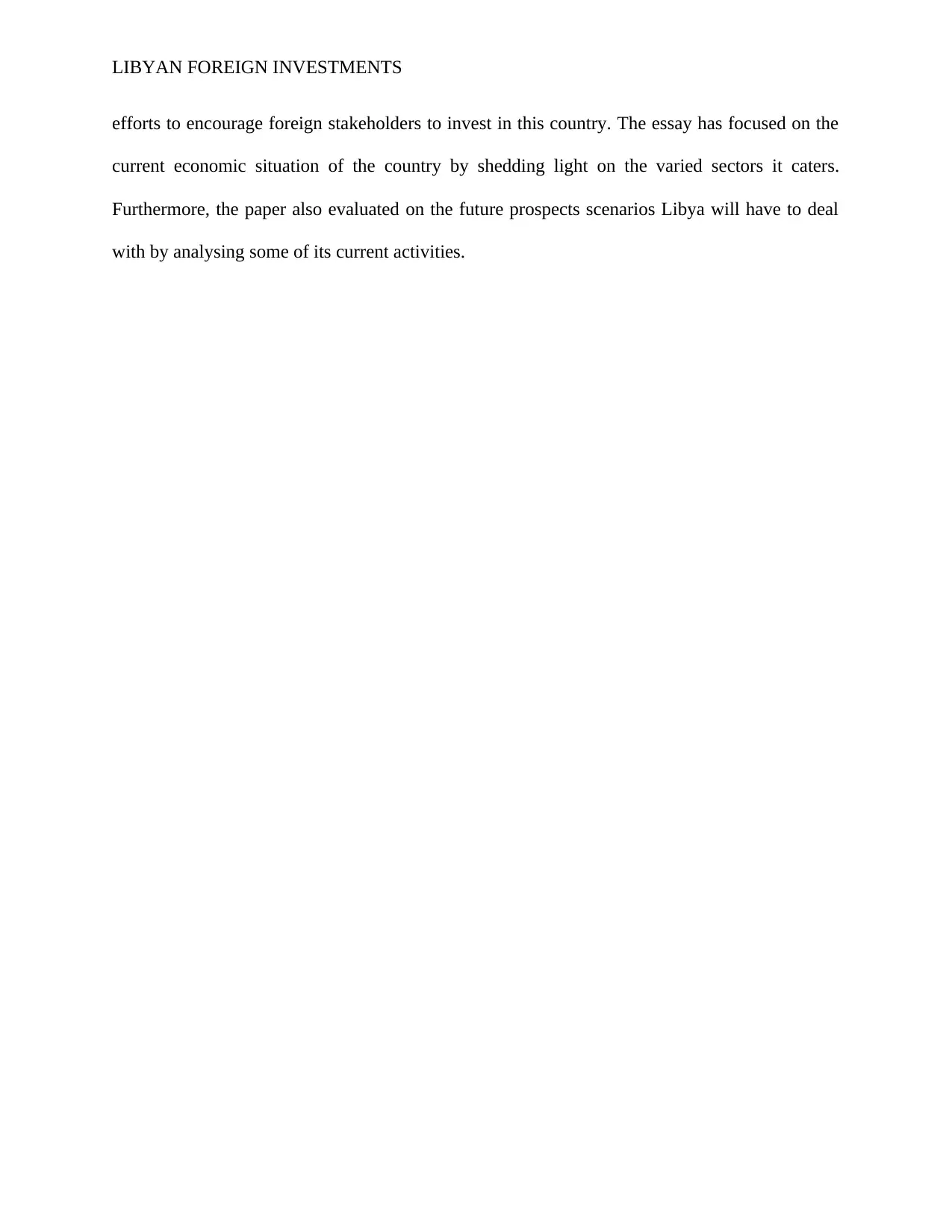
LIBYAN FOREIGN INVESTMENTS
efforts to encourage foreign stakeholders to invest in this country. The essay has focused on the
current economic situation of the country by shedding light on the varied sectors it caters.
Furthermore, the paper also evaluated on the future prospects scenarios Libya will have to deal
with by analysing some of its current activities.
efforts to encourage foreign stakeholders to invest in this country. The essay has focused on the
current economic situation of the country by shedding light on the varied sectors it caters.
Furthermore, the paper also evaluated on the future prospects scenarios Libya will have to deal
with by analysing some of its current activities.
⊘ This is a preview!⊘
Do you want full access?
Subscribe today to unlock all pages.

Trusted by 1+ million students worldwide
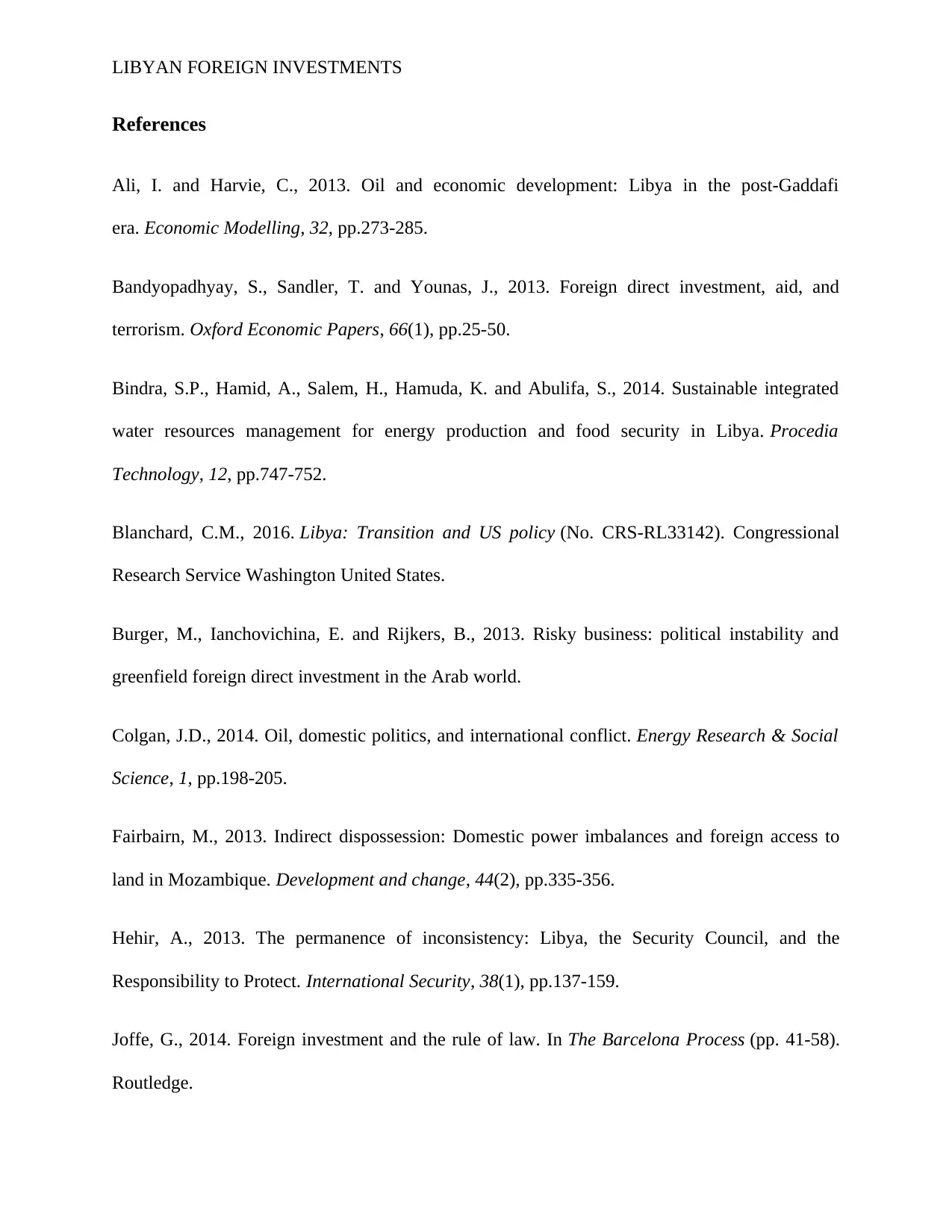
LIBYAN FOREIGN INVESTMENTS
References
Ali, I. and Harvie, C., 2013. Oil and economic development: Libya in the post-Gaddafi
era. Economic Modelling, 32, pp.273-285.
Bandyopadhyay, S., Sandler, T. and Younas, J., 2013. Foreign direct investment, aid, and
terrorism. Oxford Economic Papers, 66(1), pp.25-50.
Bindra, S.P., Hamid, A., Salem, H., Hamuda, K. and Abulifa, S., 2014. Sustainable integrated
water resources management for energy production and food security in Libya. Procedia
Technology, 12, pp.747-752.
Blanchard, C.M., 2016. Libya: Transition and US policy (No. CRS-RL33142). Congressional
Research Service Washington United States.
Burger, M., Ianchovichina, E. and Rijkers, B., 2013. Risky business: political instability and
greenfield foreign direct investment in the Arab world.
Colgan, J.D., 2014. Oil, domestic politics, and international conflict. Energy Research & Social
Science, 1, pp.198-205.
Fairbairn, M., 2013. Indirect dispossession: Domestic power imbalances and foreign access to
land in Mozambique. Development and change, 44(2), pp.335-356.
Hehir, A., 2013. The permanence of inconsistency: Libya, the Security Council, and the
Responsibility to Protect. International Security, 38(1), pp.137-159.
Joffe, G., 2014. Foreign investment and the rule of law. In The Barcelona Process (pp. 41-58).
Routledge.
References
Ali, I. and Harvie, C., 2013. Oil and economic development: Libya in the post-Gaddafi
era. Economic Modelling, 32, pp.273-285.
Bandyopadhyay, S., Sandler, T. and Younas, J., 2013. Foreign direct investment, aid, and
terrorism. Oxford Economic Papers, 66(1), pp.25-50.
Bindra, S.P., Hamid, A., Salem, H., Hamuda, K. and Abulifa, S., 2014. Sustainable integrated
water resources management for energy production and food security in Libya. Procedia
Technology, 12, pp.747-752.
Blanchard, C.M., 2016. Libya: Transition and US policy (No. CRS-RL33142). Congressional
Research Service Washington United States.
Burger, M., Ianchovichina, E. and Rijkers, B., 2013. Risky business: political instability and
greenfield foreign direct investment in the Arab world.
Colgan, J.D., 2014. Oil, domestic politics, and international conflict. Energy Research & Social
Science, 1, pp.198-205.
Fairbairn, M., 2013. Indirect dispossession: Domestic power imbalances and foreign access to
land in Mozambique. Development and change, 44(2), pp.335-356.
Hehir, A., 2013. The permanence of inconsistency: Libya, the Security Council, and the
Responsibility to Protect. International Security, 38(1), pp.137-159.
Joffe, G., 2014. Foreign investment and the rule of law. In The Barcelona Process (pp. 41-58).
Routledge.
Paraphrase This Document
Need a fresh take? Get an instant paraphrase of this document with our AI Paraphraser
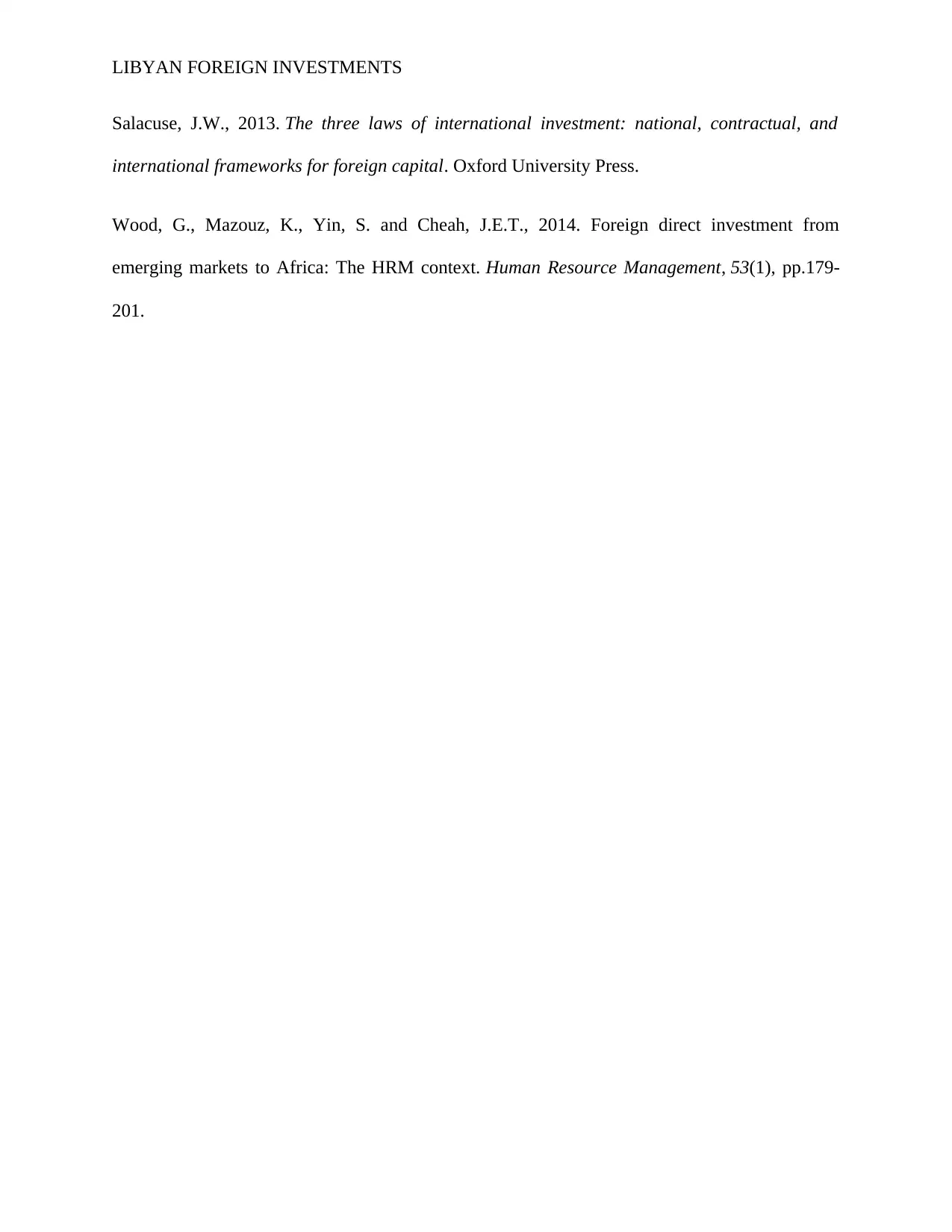
LIBYAN FOREIGN INVESTMENTS
Salacuse, J.W., 2013. The three laws of international investment: national, contractual, and
international frameworks for foreign capital. Oxford University Press.
Wood, G., Mazouz, K., Yin, S. and Cheah, J.E.T., 2014. Foreign direct investment from
emerging markets to Africa: The HRM context. Human Resource Management, 53(1), pp.179-
201.
Salacuse, J.W., 2013. The three laws of international investment: national, contractual, and
international frameworks for foreign capital. Oxford University Press.
Wood, G., Mazouz, K., Yin, S. and Cheah, J.E.T., 2014. Foreign direct investment from
emerging markets to Africa: The HRM context. Human Resource Management, 53(1), pp.179-
201.
1 out of 8
Related Documents
Your All-in-One AI-Powered Toolkit for Academic Success.
+13062052269
info@desklib.com
Available 24*7 on WhatsApp / Email
![[object Object]](/_next/static/media/star-bottom.7253800d.svg)
Unlock your academic potential
Copyright © 2020–2026 A2Z Services. All Rights Reserved. Developed and managed by ZUCOL.





